Participant Biographies
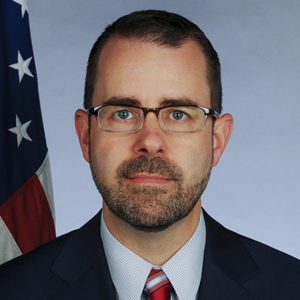
Knox Thames
Knox Thames is the Special Advisor for Religious Minorities in the Near East and South / Central Asia at the U.S. Department of State in Washington, D.C. This is a newly created position; Mr. Thames was appointed as the first Special Advisor in September 2015 to lead State Department efforts to address the situation of religious minorities in these regions. Mr. Thames holds a BA from Georgetown College, a JD from American University’s Washington College of Law, and an MA in international affairs from American University’s School of International Service. He also studied at Jagiellonian University in Krakow, Poland. He was the director of policy and research at the U.S. Commission on International Religious Freedom, served in the Office of International Religious Freedom at the State Department, and was counsel at the U.S. Commission on Security and Cooperation in Europe (the Helsinki Commission). He is an adjunct professor at the U.S. Army War College, and is part of the State Department’s Religion and Foreign Policy Working Group. His writing has been featured in the Yale Journal of International Affairs, ForeignPolicy.com, and Small Wars Journal.
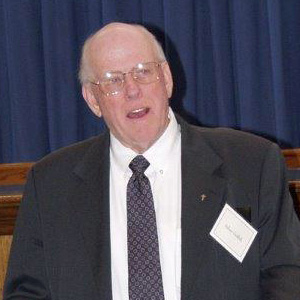
Sidney H. Griffith
Sidney H. Griffith is Ordinary Professor Emeritus in the Department of Semitic and Egyptian Languages and Literatures in the School of Arts and Sciences at the Catholic University of America, where under the direction of Professor Richard M. Frank he earned the Ph.D. in 1977 with a thesis entitled, “The Controversial Theology of Theodore Abū Qurrah (c.750-c.820 AD): A Methodological, Comparative Study in Christian Arabic Literature.” His areas of interest and academic responsibility are Syriac Patristics, Christian Arabic Literature, and the history of Christian/Muslim relations, especially within the World of Islam and in the Early Islamic period. In addition to numerous articles in his areas of interest, his publications include studies on the life and thought of St. Ephraem the Syrian, biblical exegesis in Syriac, and Syrian monasticism. Regarding Arabic Christianity, publications include: The Beginnings of Christian Theology in Arabic: Muslim-Christian Encounters in the Early Islamic Period (2002); Yayā ibn ‘Adī, The Reformation of Morals: A Parallel Arabic-English Edition (2002); The Church in the Shadow of the Mosque: Christians and Muslims in the World of Islam (2008); The Bible in Arabic: The Scriptures of the ‘People of the Book’ in the Language of Islam (2013); Sidney H. Griffith & Sven Grebenstein (eds.),Christsein in der islamischen Welt: Festschrift fürMartin Tamcke zum 60. Geburtstag (Wiesbaden: Harrassowitz, 2015). His most recent research interest focuses on Late Antique, Syriac Christology in Qur’ānic perspective, The Christian Intellectuals of Baghdad in Abbasid times, and Christian/Muslim exchanges in thirteenth and fourteenth century Cairo.
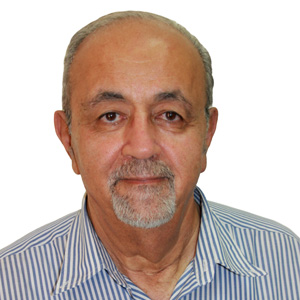
Bernard Sabella
Bernard Sabella is an elected Member of the Palestinian Legislative Council representing Jerusalem and Executive Secretary, Department of Service to Palestinian Refugees. His scientific and research interests focus on Palestinian society. He received his BA from Franklin and Marshall University, and his MA and PhD degrees in sociology from the University of Virginia, Charlottesville. He is retired from Bethlehem University where he was a professor of sociology. From 2011-2015, he was chairperson of the Palestinian delegation to the Parliamentary Assembly of the Council of Europe in Strasbourg. He was also executive secretary of the Department of Services to Palestinian Refugees in the Middle East Council of Churches. His publications include an Introduction to Sociology (1983),A Date with Democracy - Palestinians on Politics, Economy and Society (1983); “Palestinian Christian Emigration from the Holy Land,”in Proche-Orient Chretien (1991); Christian Emigration-Comparison Between Jerusalem, Ramallah and Bethlehem Areas (1991);Jerusalem: A Christian Perspective (1995); A Date with Democracy: Palestinians on Society and Politics, An empirical Study, with Theodore Hanif (1996); “The Emigration of Christian Arabs: Dimensions and Causes of the Phenomenon,” in Christian Communities in the Arab Middle East: The Challenge of the Future, Andreas Pacini ed., (1998); “Palestinian Christians and the Second Intifada,” in Grunner and Gran (eds.) In the Shadow of Occupation (2004); “The Status of Non-Muslims in a Palestinian State,” in Kajsa Ahlstrand and Goran Gunner (eds.); Non-Muslims in Muslim Majority Societies: With Focus on the Middle East and Pakistan (2009); “Catholic Social Teaching and Vatican Relations with Israelis and Palestinians,” in Carole Monica Burnett’s Zionism through Christian Lenses: Ecumenical Perspective on the Promised Land, (2013), and “Palestine and Palestinian Christians, in Edinburgh Companions to Global Christians (2016); as well as several articles and book chapters dealing with the issue of emigration of Christian Arabs from the Middle East.
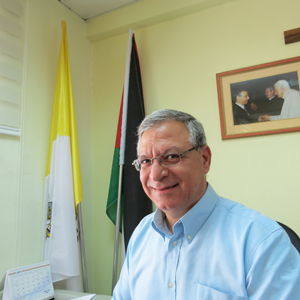
Sami El-Yousef
Sami El-Yousef is the Regional Director of the Jerusalem field office of the Catholic Near East Welfare Association – Pontifical Mission for Palestine (CNEWA – Pontifical Mission), an agency of the Holy See established in 1949 to aid Palestinian refugees. He is a native of the Old City of Jerusalem, and belongs to one of that city’s oldest Christian families. Mr. El-Youssef received a BS in chemical engineering from the University of Massachusetts-Amherst and an MS in industrial engineering from the University of Pittsburgh. He spent twenty-four years of his academic career in a number of teaching and administrative positions at Bethlehem University, including dean of the faculty of Business Administration, assistant to the academic vice president, and vice president for Finances and Planning. Since 2009, he has devoted himself to humanitarian work as regional director for CNEWA. In addition, Mr. El-Yousef serves on the governing boards of a number of local institutions serving in education, healthcare, and social services.
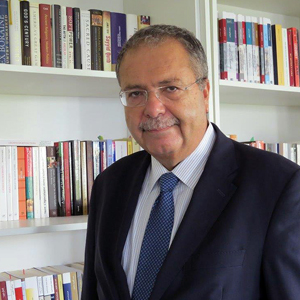
Tarek Mitri
Tarek Mitri is director of the Issam Fares Institute for Public Policy and International Affairs (IFI) at the American University of Beirut. A graduate of the American University of Beirut (AUB) he earned a doctorate from the Université de Nanterre Paris X. He is the author of a number of books and articles on religion and politics and on interreligious and intercultural dialogue, in Arabic, English, and French. He served in successive governments in Lebanon between 2005 and 2011 as Minister of Environment, Minister of Administrative Reform, Minister of Culture, Minister of Information, and Acting Minister of Foreign Affairs. He has also served as special representative of the UN Secretary General and head of the UN Support Mission in Libya from 2012 to 2014. Dr. Mitri has taught at the University of Saint Joseph, (Beirut), Balamand University (Lebanon), University of Geneva, Amsterdam Free University, Harvard University, and at the American University of Beirut. He also has served as chairman of the Board of Trustees of the Institute of Palestine Studies, chairman of the Board of the Nicolas Sursock Museum (Beirut), member of the Strategic Council of Université Saint Joseph (USJ), and member of the Executive Board of the Arab Center for Research and Policy Studies in Doha, Qatar.
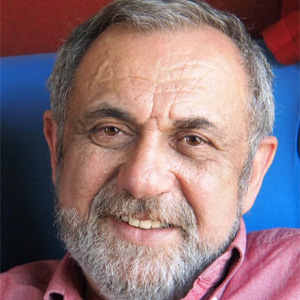
Fateh Azzam
Until recently, Fateh Azzam was the founding director of the Asfari Institute for Civil Society and Citizenship at the American University of Beirut, which promotes the development of an informed and engaged citizenry in the Arab world through research, education and public discussions. He previously served as regional representative for the Middle East of the UN High Commissioner for Human Rights, director of the Forced Migration and Refugee Studies Program at the American University in Cairo, program officer for Human Rights at the Ford Foundation’s Offices in Lagos and Cairo, and director of the Palestinian human rights organization Al-Haq. Mr. Azzam received his BA in community planning from UMASS-Boston and his LLM in international human rights law from the University of Essex. He is a member of the Independent Commission for Human Rights, the Palestinian national human rights institution. Mr. Azzam has written widely on Arab constitutions and human rights in the Arab region, the right to development and the Responsibility to Protect, and has published two plays: Ansar (1991), about life in Ketziot, the Israeli detention facility, and Baggage (2001), about the struggle between freedom and responsibility in the refugee diaspora.

Alon Ben-Meir
Alon-Ben Meir is professor and senior fellow at New York University’s Center for Global Affairs and senior fellow at the World Policy Institute. Dr. Ben-Meir received an MA in philosophy and a PhD in international relations from Oxford University. He has authored seven books related to the Middle East; his current manuscript is about the psychological dimension of the Israeli-Palestinian conflict. Dr. Ben-Meir has been directly involved in negotiations between Israel and neighboring countries, and also with Turkey. He appears regularly on television, including ABC, NBC, CNN, Al Jazeera, Al Arabiya, Al-Hurra, and Russia Today. He hosts “Global Leaders: Conversations with Alon Ben-Meir,” a series of conversations with top global policymakers held each semester at NYU. Dr. Ben-Meir regularly briefs the U.S. State Department for the International Visitors Program.
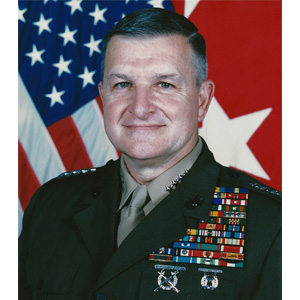
General Anthony C. Zinni (retired)
General Anthony Zinni is a retired Marine Corps four-star general. His joint assignments included command of a joint task force and a unified command (United States Central Command) from 1997-2000 and several joint and combined staff billets at joint task force and unified command levels. He received a BA in economics from Villanova University, an MA in international relations from Salve Regina College, an MA in management and supervision from Central Michigan University, an MA in negotiation and dispute resolution from Creighton University, and is currently pursuing a doctoral degree in interdisciplinary leadership at Creighton University. General Zinni has received honorary doctorates from Villanova University, The College of William and Mary, and the Maine Maritime Academy. General Zinni has participated in presidential diplomatic missions to several countries, and State Department missions involving the Israeli-Palestinian conflict and conflicts in Indonesia and the Philippines. In 1991, he was chief of staff and deputy commanding general of Operation Provide Comfort, the U.S.-led effort to provide protection and assistance to millions of Iraqi Kurds fleeing Saddam Hussein's reprisals in the wake of the 1991 Gulf War. He also served as the military coordinator for Operation Provide Hope (a humanitarian operation conducted by the U.S Air Force to provide medical equipment to former Soviet republics during their transition to democratic and free-market states); director of operations for the Unified Task Force in Somalia for Operation Restore Hope from 1992 to1993; and, in 1993, assistant to the U.S. special envoy to Somalia during Operation Continued Hope. General Zinni has held several academic positions, including the Terry Sanford Lecturer in Residence and Visiting Professor at Duke University, the Rhodes Class of ’56 Professorship at Cornell University, the Stanley Chair in Ethics at the Virginia Military Institute, and the Nimitz Chair at the University of California, Berkeley. Among his other positions are Distinguished Advisor at the Center for Strategic and International Studies, a member of the Council on Foreign Relations, Chairman of the Board of the Institute of World Affairs, member of the Senate Foreign Relations Committee Policy Advisory Group, and Chairman of the Board of the Middle East Institute.
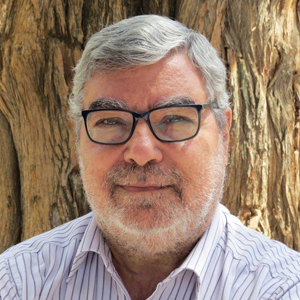
Rami Khouri
Rami George Khouri is an internationally syndicated political columnist and author. Mr. Khouri received has a BA in political science and an MSc degree in mass communications from Syracuse University. He was the first director, and is now a senior fellow, at the Issam Fares Institute for Public Policy and International Affairs at the American University of Beirut. He is a nonresident senior fellow at the Kennedy School of Harvard University and visiting fellow at the Georgetown University Center for Regional and International Studies in Doha, Qatar. He is a columnist (and former executive editor) of the Beirut-based newspaper The Daily Star, and an internationally syndicated columnist via Agence Global in the USA. Previously, he was editor-in-chief of the Jordan Times for seven years, and for 18 years was general manager of Al Kutba, Publishers, in Amman, Jordan, where he also served as a consultant to the Jordanian tourism ministry on biblical archaeological sites. He teaches or lectures annually at the American University of Beirut and Northeastern University. He has been a visiting scholar or lecturer at Harvard, Mount Holyoke, Princeton, Syracuse, Villanova, The Fletcher School at Tufts, Northeastern, Denver, Oklahoma and Stanford universities, and is a member of the Brookings Institution Task Force on U.S. Relations with the Islamic World. Mr. Khouri is a fellow of the Palestinian Academic Society for the Study of International Affairs (Arab East Jerusalem). He also serves on the Joint Advisory Board of the Northwestern University Journalism School in Doha, Qatar and Georgetown University’s Center for Regional and International Studies in Doha, Qatar. He recently completed a four-year term on the International Advisory Council of the International Committee of the Red Cross. In 2006, Mr. Khouri was awarded the Pax Christi International Peace Prize.

Brian Katulis
Brian Katulis is a senior fellow at American Progress, where his work focuses on U.S. national security strategy and counterterrorism policy. For more than a decade, he has advised senior U.S. policymakers on foreign policy, and has provided expert testimony to key congressional committees, including the U.S. Senate Committee on Foreign Relations and the U.S. Senate Armed Services Committee. Mr. Katulis received a BA in history and Arab and Islamic Studies from Villanova University and an MA from Princeton’s Woodrow Wilson School for Public and International Affairs. In 1994 and 1995, he was a Fulbright scholar in Jordan. Mr. Katulis has conducted extensive research on the ground in Egypt, the Palestinian territories, Israel, and Jordan. He worked at the National Security Council and the U.S. Departments of State and Defense under President Bill Clinton, and also for Greenberg Quinlan Rosner Research, the National Democratic Institute for International Affairs, Freedom House, and former Pennsylvania Governor Robert Casey. Mr. Katulis regularly provides commentary on television and radio, including “PBS NewsHour” and National Public Radio, and has published articles in The New York Times, The Washington Post, and The Wall Street Journal. He is co-author with Nancy Soderberg of The Prosperity Agenda, a book on U.S. national security (John Wiley & Sons, 2008).
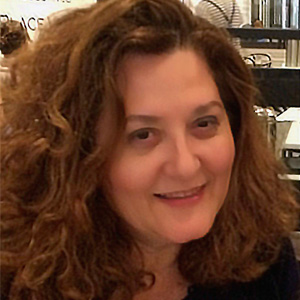
Elizabeth H. Prodromou
Elizabeth H. Prodromou is visiting associate professor of conflict resolution at The Fletcher School for Law & Diplomacy at Tufts University, where she teaches in the International Negotiation and Conflict Resolution program. Dr. Prodromou received a BA from Tufts University and an SM and PhD in political science from the Massachusetts Institute of Technology. She is co-chair of the Eastern Mediterranean and Europe Study Group at Harvard University’s Center for European Studies. Dr. Prodromou was vice chair and commissioner on the U.S. Commission on International Religious Freedom (2004-2012); she was also a member of the U.S. Secretary of State’s Religion & Foreign Policy Working Group, serving on the subgroup on Religious Freedom, Democracy, and Security in the Middle East and North Africa (2011-2016). Her research deals with issues of religious freedom, democratization, and security threats, with focus on religious and political regime types in the Near East and on Transatlantic responses to religious radicalism. Her current research focuses on strategies of religious institutions in response to state repression and persecution, and on Orthodox Christianity and geopolitics. Some of her publications include Orthodox Christianity, Higher Education and the University: Theological, Historical, and Contemporary Reflection (UNDP 2016); Thinking Through Faith: Perspectives from Orthodox Christian Scholars (SVSP, 2008); “Orthodox Christianity and Humanitarianism: An Introduction to Thought and Practice, Past and Present,” in Review of Faith & International Affairs (Spring 2016); and numerous contributions to books and journals.
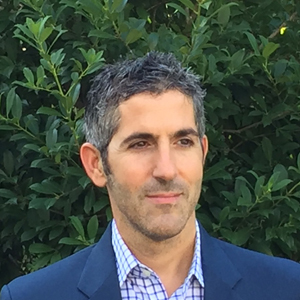
Ussama Makdisi
Ussama Makdisi is professor of history and the first Arab-American Educational Foundation Chair of Arab Studies at Rice University. He received a BA from Wesleyan University and a PhD in history from Princeton. In 2012-2013, Dr. Makdisi was a resident fellow at the Wissenschaftskolleg zu Berlin (Institute for Advanced Study, Berlin). In April 2009, the Carnegie Corporation named Dr. Makdisi a 2009 Carnegie Scholar as part of its effort to promote original scholarship regarding Muslim societies and communities, both in the U.S. and abroad. Dr. Makdisi is the author of Faith Misplaced: the Broken Promise of U.S.-Arab Relations, 1820-2001 (Public Affairs, 2010). His previous books include Artillery of Heaven: American Missionaries and the Failed Conversion of the Middle East (Cornell University Press, 2008), winner of the 2008 Albert Hourani Book Award from the Middle East Studies Association, the 2009 John Hope Franklin Prize of the American Studies Association, and co-winner of the 2009 British-Kuwait Friendship Society Book Prize, given by the British Society for Middle Eastern Studies. He is also the author of The Culture of Sectarianism: Community, History, and Violence in Nineteenth-Century Ottoman Lebanon (University of California Press, 2000) and co-editor of Memory and Violence in the Middle East and North Africa (Indiana University Press, 2006). Among his major articles are “Anti-Americanism in the Arab World: An Interpretation of Brief History” which appeared in the Journal of American History, and “Ottoman Orientalism” and “Reclaiming the Land of the Bible: Missionaries, Secularism, and Evangelical Modernity,” both of which appeared in the American Historical Review. Dr. Makdisi has also published in the International Journal of Middle East Studies, Comparative Studies in Society and History, and Middle East Report.
